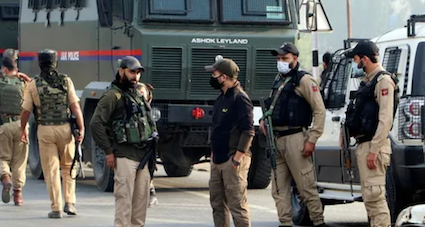The Jammu and Kashmir government has ordered premature retirement (virtually dismissal) of 36 police personnel under Article 226 (2) of the Civil Service Regulations, 1956. The provision is meant to be used by the government for weeding out the inefficient and corrupt officers from service in public interest. A virtually omnibus “public interest’’ is the most widely used, as also rampantly misused, phrase in administrative set-ups, be it of the Central or state governments.
These policemen include 4 Assistant Sub Inspectors (ASIs), 8 Head Constables (HCs), besides many SgtCts (Sergeant Constables) and Constables. That means only the lower rungs of the constabulary have been touched and targeted, and subjected to scrutiny, a serving SSP who requested anonymity, said. These dismissal officials could hardly have indulged in corrupt practices and criminal activities (as alleged) if the chain of command was robust and effective, he pointed out.
It is common knowledge in Jammu & Kashmir that several policemen, of different ranks, are involved in facilitating encroachments on government and private lands. They have often been linked unofficially to clashes between rival gangs which specialise in several criminal activities, and provide illegal protection services. Grapevine has it that some retired officers of the rank of IG were involved in land deals but could not be caught as there was “insufficient evidence’’ against them.
Serious criminal charges and doubtful integrity are two most common terms used in internal correspondence by the Review Committee which recommended these forced retirements. It has also said that the performance of these employees was found “unsatisfactory’’ and their continuation in government service was found to be against “public interest’’. Officials associated with various processes said that LG Manoj Sinha’s government has also terminated many employees from service on account of “anti-national activities’’.
Incidentally, the government has often resorted to invoking Article 311 of the Indian Constitution which empowers it to “dismiss, removal or reduction in rank’’ (of any impugned employee). This provision is used by the government to dispense with the need for conducting an inquiry and sharing the findings publicly. It is thus considered a more powerful tool (than 226) used for punishing employees.
In August this year, the government had dismissed four employees, including Assabah Arjumand Khan, JKAS (Jammu Kashmir Administrative Service), the wife of Bitta Karate. Bitta became notorious three decades ago for allegedly murdering many Kashmiri Pandits, presently facing terror charges and lodged in jail. An associate professor and a Kashmir University scientist had also been dismissed for “anti-national activities’’.
The government has powers, under 226 of CSR rules, to retire any employees after he/she has completed “22 years of qualifying service or 48 years of age’’. Such employees have to be given three month’s salary and are entitled to the pension they have earned while being in service.
According to standing orders, respective departments have to maintain registers of all employees who have attained the age of 48 years at the beginning of the calendar year. This is meant to help the appropriate authorities in the process of review of the performance of all employees. The Review Committee is a high-powered committee usually comprising several IAS officers directly supervised by the chief secretary.
These committees are different in case of gazetted and non-gazetted government employees. But top officials of the GAD (General Administration Department), Home Department and Law & Parliamentary Affairs are made members in both the committees.
The provisions regarding forced retirement or dismissals were used by Mufti Mohammad Sayeed after he became Chief Minister of Jammu and Kashmir in November 2002 with much fanfare. Several gazetted officers as also non-gazetted employees were among those dismissed from service for alleged corrupt practices. However, these forced retirements (termed dismissals) were challenged in courts by those employees axed from service by the government. In most cases (barring a very few), these employees got back their jobs later after many years of uncertainty.
(Sant began as a teacher but after six years, joined the Indian Express, Chandigarh in 1990, the year when terrorism was taking its first step in J & K and soon there would be exodus of lakhs of Kashmiri Pandits from the Valley. He subsequently worked for The Statesman, The Times of India and Star News among others. He is based in Jammu since May 2000. He edits epaper.earthnews.in, a newspaper from Jammu presently.)


